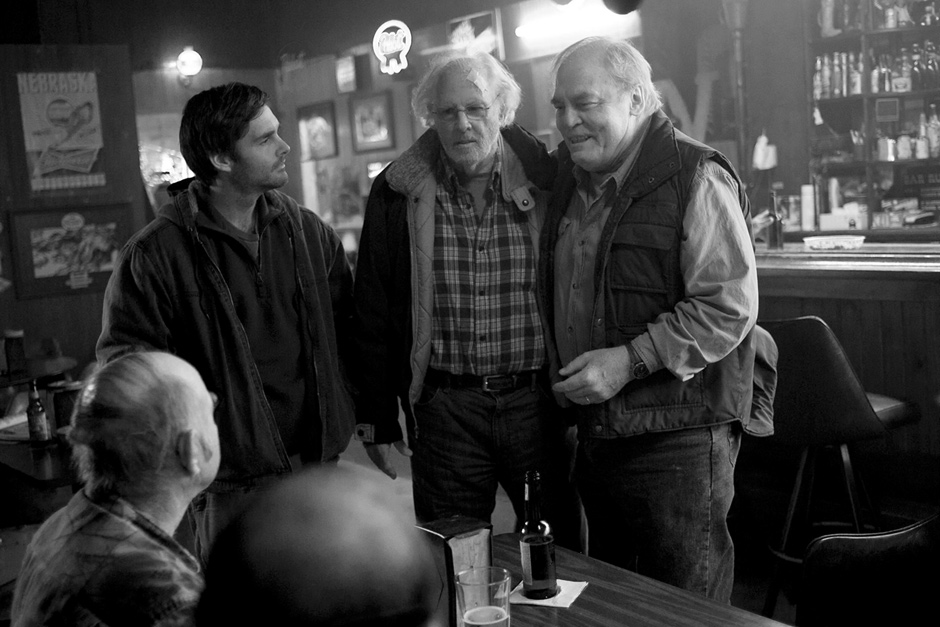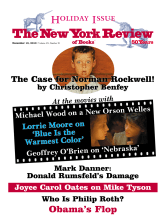Alexander Payne’s Nebraska is a comedy without boffo punch lines, jokey monologues, chases, pratfalls, flights of whimsical invention, or preposterous coincidences. What it does have is incipient dementia, terminal boredom, lingering resentment, and the collapsed remains of a crib where an infant died of scarlet fever, served up with repetitive snatches of melancholy fiddle music and the sublime desolation of empty highways and decaying towns. Although working uncharacteristically with a screenplay by another writer (Bob Nelson), Payne has made a film that seems steeped in personal preoccupations and that in retrospect adds new dimensions to his earlier films.
Its premise is so bald that the film seems to run through its possibilities in the first fifteen minutes. Woody Grant (Bruce Dern), a disheveled old alcoholic in Billings, Montana, is determined to get to Lincoln, Nebraska—on foot if necessary—to collect the million-dollar prize promised by an unsolicited sweepstakes certificate from Cornhusker Marketing and Promotions, Inc. David (Will Forte), the younger of his two sons, who holds down a job selling audio equipment at the mall and whose girlfriend has just dumped him, agrees to drive him there though he finds it difficult even to keep a conversation going with his father, who speaks largely in monosyllabic dead ends.
In short order father and son are taking off down the road while Woody’s wife (June Squibb), who has already talked about putting him in a home, asks if they’ve both lost their minds. After a single day’s drive Woody has gotten drunk, lost his dentures by the railroad tracks, and sustained a head wound that lands him in the hospital. A long and minimalist road seems to loom ahead, leading through lost causes and nearly nonexistent last chances. As they proceed we are immersed in vacant panoramas of midwestern roadway, immense and beautiful images in which the eye can happily lose itself, as if that were one way to escape from a journey with no good end in sight and a father–son dialogue stuck in a start-and-stop pattern of missed connections. Such establishing shots of locations, images of serene indifferent clarity, have figured in all Payne’s films but in the black-and-white cinematography of Nebraska they achieve an overpowering eloquence.
The father doesn’t want to say much of anything; the son isn’t sure how much he really wants to know, since everything he hears disconcerts him by its resigned withdrawal. Woody wants to collect his prize and beyond that doesn’t much care about anything. What does Dave really want from him, anyway? Perhaps the self-justification of having tried to be a dutiful son; perhaps a way to avoid dwelling on the inadequacies of his own life, a life as adrift in its own way as his father’s. All this would be matter for the most lugubrious of domestic dramas. But Payne, here as in his previous films, finds the edge of comedy everywhere, and thus his films have been able to accommodate abortion, illness, brain death, the various humiliations of thwarted lust and cuckoldry, of age and professional superannuation, petty grudges, failed ambition, an endless shopping list of regrets, without losing a certain sweetness of temperament even as they confront the most abrasive limits.
Minimalism is not his way, and so after its austere beginning Nebraska veers into a series of detours and reunions—a visit to Woody’s hometown, with old family and local quarrels and threatening talk of payback for unpaid debts rising to the surface—until even in its isolated setting the film is fully inhabited. Payne’s reputation as a director of actors is well earned. Bruce Dern’s much-praised performance as Woody is indeed superb—just as Jack Nicholson in About Schmidt succeeded in not being Jack Nicholson, Dern here sheds some of the wild-eyed grandstanding of earlier days to submerge himself in a shambling hulk who when asked about his earlier ambitions for himself can only reply: “I don’t remember. It doesn’t matter.” Will Forte incarnates with awkward exactness the young man putting up with all the tedium and dysfunction of the old by relishing the fact that he can at least size up situations realistically, as if that sharper edge of youthful perception might be his only consolation.
What counts for everything, though, is the mixing in of all the performances, professional and otherwise, since Payne likes to cast nonactors in small roles. Patterns of local speech are at the heart of Nebraska. People are terse and soft-spoken and polite, except when they aren’t; they say as little as possible but are always ready with the appropriate catchphrase: “stubborn as a mule” or “holler if you need something.” There is no weeping or yelling in this world, and even the ugliest of threats are uttered in carefully muted tones. Much of what is said comes slowly, in between the long silences of a family get-together where nobody has much to say: “Uncle Ray’s foot hurts.” “You still drive a Chevy, Verne?” If Nebraska’s power is rhythmic and cumulative, it’s the cadences of speech that provide the rhythmic structure, and the inflections and emphases of speech—including the things held back but evident anyway—that slowly pile up to create the vivid impression of a place where people really live.
Advertisement
Some have found the characterizations condescending or caricatural; even if we include the two enormous and menacing cousins who covet Woody’s delusory million dollars, I detect only the slightest margin of exaggeration for comic effect. It hardly seems that the director’s native region is being singled out for mockery. You don’t need to go to Nebraska to witness such scenes. You don’t even need to go to America. Far from indulging in easy contempt or ironic disdain, Payne’s work seems rooted in close observation and delicate distinctions of tone.
Two actors are especially crucial. Angela McKewan, as Woody’s old girlfriend, now editor of the local paper, turns one scene and a single wordless close-up into an absolutely luminous characterization—a vision of something like pure kindness in a rather unforgiving place—that without fanfare crystallizes the emotional tone of the whole movie. And the elderly June Squibb, as the quintessence of everyday outspoken bluntness, turns out to be the film’s indispensable engine, the one character who remains completely alive to what is going on, right up to the moment when she straightens Woody’s hair in the hospital and—in an almost solitary note of physical tenderness—bends to give him a brief but not perfunctory kiss. Her salty tour of the local cemetery, as she passes Woody’s family in review—remarking of his sister Rose, dead in a car accident, “I liked Rose but my God she was a slut”—culminates in an almost Chaucerian jest as the old woman lifts up her skirts over the grave of a buried suitor: “See what you could have had if you hadn’t talked about wheat all the time?”
Nebraska is Payne’s own home ground, the setting of his first three films, Citizen Ruth, Election, and About Schmidt: the first two harshly hilarious political comedies, the third a contemplation of a retired man plumbing the depths of his own hollowness, almost too bleak to be called any kind of comedy. After two excursions into ostensible terrestrial paradises—the California wine country of Sideways and the Hawaiian beachfront properties of The Descendants—he has gone back home and in the process jettisoned the upscale accessories of the last two films, along with their flitting promises of erotic pleasure and emotional fulfillment. This is a journey into the country of the old, culminating in a visit to the abandoned family homestead. There are no attractive young people here, no children except the boy who snaps Woody’s picture for the newspaper, a boy who presumably will grow up and get out of town as fast as he can.
But the journey’s end is hardly the point, although Woody and Dave do get to Lincoln and Woody does end up with some kind of prize to be savored for a long satisfying moment. Payne’s films tend to be about journeys or campaigns with dubious goals and doubtful outcomes. The stark progress down the road is the mere pushing forward to the next stage of the trajectory, while fending off the suspicion that all this relentless movement may prove purposeless. A condition of permanent uncertainty creates a mood that can move fluidly, with the slightest of accentuations, between farce and poignancy. An authentic pathos is extracted with great skill from in between the constant jabbing notation of gesture and attitude and manners; which is to say that Payne seems a true comic artist of the oldest and most deadly serious kind, for whom comedy is not deflection or distraction but a head-on gaze even into the direst circumstances.
This Issue
December 19, 2013
Mike
An American Romantic
Gazing at Love




